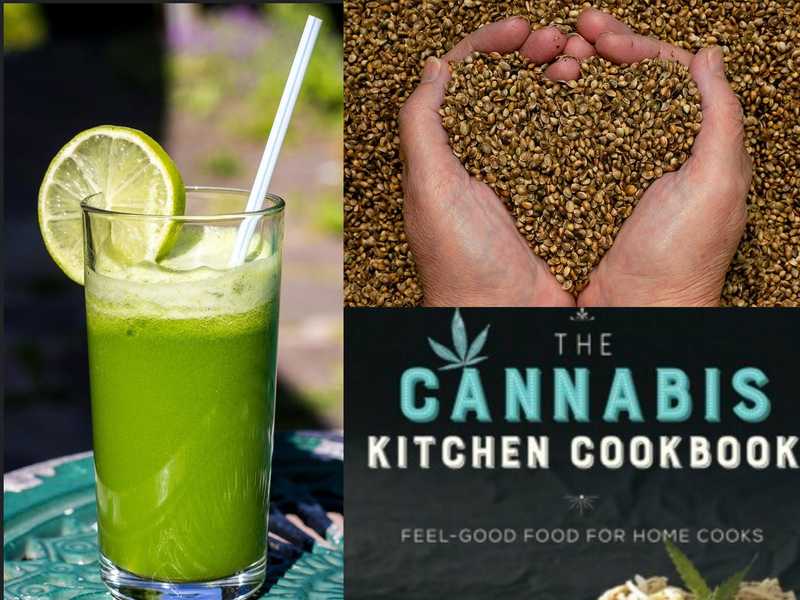Medical cannabis has gained traction in recent years along the same timeframe that health food trends have sky rocketed. Cannabis is often seen as a healthy alternative to side effect-riddled pharmaceuticals, such as opioids, and many people use cannabis as a component in holistic health treatment. The marijuana industry is embracing the full potential of cannabis by moving towards the world of holistic health and wellness. Marijuana is slowly taking its rightful place in the ranks as not only an extremely effective medication, but as a healthy food product as well.
Often the first things that come to peoples’ minds when they think about cannabis edibles is candy such as gummy bears, brownies, and chocolate. There are many companies, however, who are looking to change the stigma that is often associated with edibles. Simply Pure, a Colorado based company, has become a pioneer in the health food cannabis industry. All of their products are vegan, sugar free, and gluten free. The company desires to be the “Whole Foods” of the medical marijuana edible industry. Simply Pure, however, is not alone in providing medical marijuana users with healthier options in the world of edibles.
Auntie Dolores is a California company that focuses on the use of whole foods, coconut sugar instead of white sugar, and includes many gluten free and vegan product options. Auntie Dolores believes that food is medicine and that their small batch, gourmet treats are a healthy way to get a daily dose of cannabis medication. Auntie Dolores even creates CBD pet treats that are infused with superfoods to reduce anxiety and pain in pets with added nutritional benefits. The company also promotes the use of coconut oil in most of their products, which has become a one of the most quintessential health foods. Coconut oil is praised for its healthy fats, moisturizing abilities, and antibacterial properties. The cannabis industry has found that the abundance of healthy saturated fats in coconut oil are extremely effective at extracting THC from marijuana.
Cannabis infused coconut oil is a very effective delivery method for cannabis and is easy for patients to make on their own. Marijuana infused coconut oil can be taken on its own or be cooked or baked into a cannabis infused treat. Combining cannabis with health foods can benefit a patient exponentially because how a patient ingests marijuana can add to or take away from the health benefits they may be receiving. Nutrition is a critical aspect of improving the overall health of people and their rate of healing, so consuming cannabis in a nutritionally beneficial way is important.
The cannabis industry is also currently embracing one of the most prevalent health trends, juicing. The juice craze first appeared several years ago and has seemingly only gotten larger. Juicing advocates claim that drinking daily juices, usually made with a mix of fruit and vegetables, leads to clearer thinking, glowing skin, and a detoxed body.
Though the benefits have yet to be scientifically proven, juicing cannabis has been found to be extremely beneficial. Juicing raw, fresh cannabis creates a nutritionally dense and potent beverage without any psychoactive effects. Cannabis juice also provides a healthy kick of fatty acids that hemp products have become known for.
It is no surprise that cannabis is gaining traction in the health food world. Its counterpart, hemp, has been officially given the title of a super food. Cannabis and hemp are the same plant, the only difference being the level of THC found in the plant. Hemp, because of its extremely low or non-existent level of THC, is available across the world in various forms. Hemp seeds have become the most popular in recent years. Hemp seeds are the highest protein seed on the market with 10 g of protein per ounce.
Each ounce of hemp seeds also contains 3/4 of a persons daily recommended vitamin E and 1/3 of a persons recommended zinc. Hemp seeds are also high in omega 3 and 6 fatty acids and antioxidants. Hemp seeds can also be pressed into an oil that can be used to food items like salad dressings. Hemp seeds and oil can easily be incorporated into a persons daily diet as a great nutritional boost. All of the benefits that are attributed to hemp are all present in cannabis, making marijuana a bonafide superfood.
Cannabis cookery is now moving beyond just hemp products and medical edibles. The Cannabis Kitchen Cookbook, written by Robyn Griggs Lawrence, shows how cannabis can be used to make healthy, nutritious food with all parts of the cannabis plant. Lawerence, the book’s author, describes cannabis as, “one of the most nutritious vegetables that we have around,” and said that, “the whole idea is how to take advantage of this amazing superfood, not how do you cook to get high.”
The recipes in the book range from curries to smoothies, all that can be modified based on the desired psychoactive effects. Some recipes, such as a pesto, use underutilized parts of the plant, such as the fan leaves. Lawrence desired for her cookbook to be a “foodie” approach to cannabis by respecting both its medicinal and culinary potential as an amazing ingredient.
As the opinion tide changes in favor of medical and recreational cannabis legalization, we are able to see more of the benefits that the plant can provide. The benefits of marijuana, outside of its medical potential and its ability to create a psychoactive reaction, are often glossed over. These unique health aspects, such as vitamins and fatty acids, are what makes cannabis even more unique as a product. Consuming cannabis can benefit your body by adding support to your immune system and providing it with nutrition to function properly, both which can help heal your body faster from various medical conditions.
